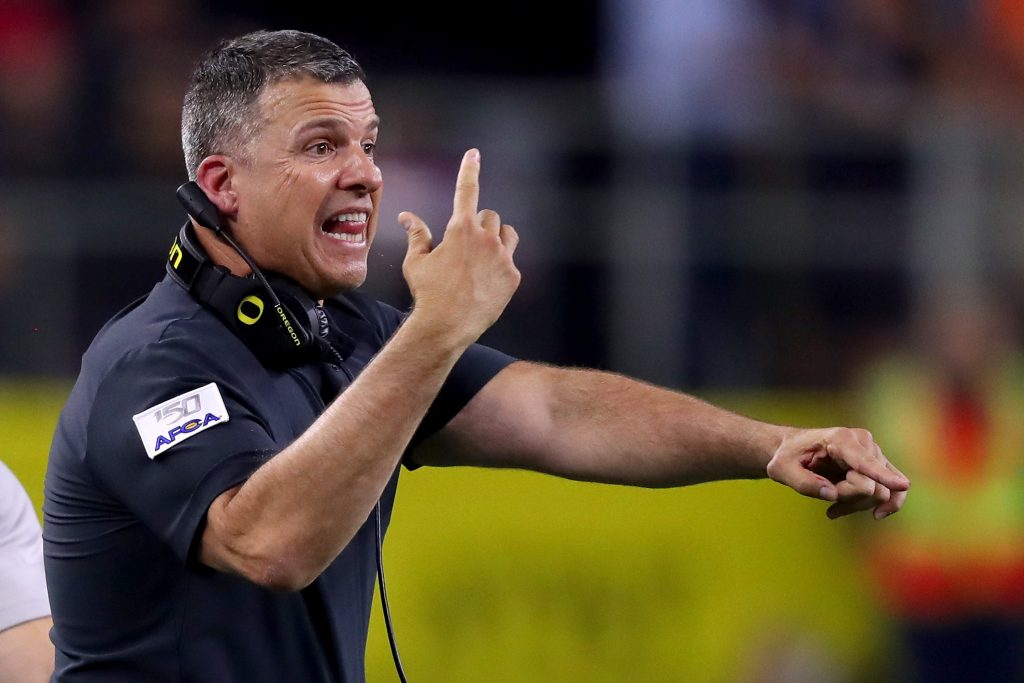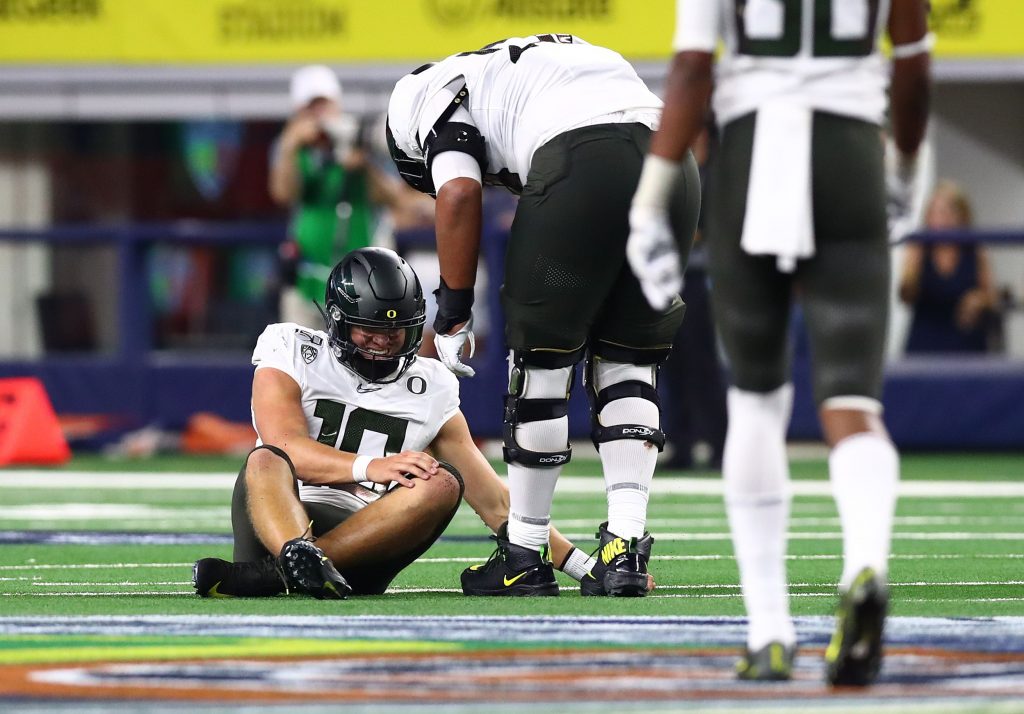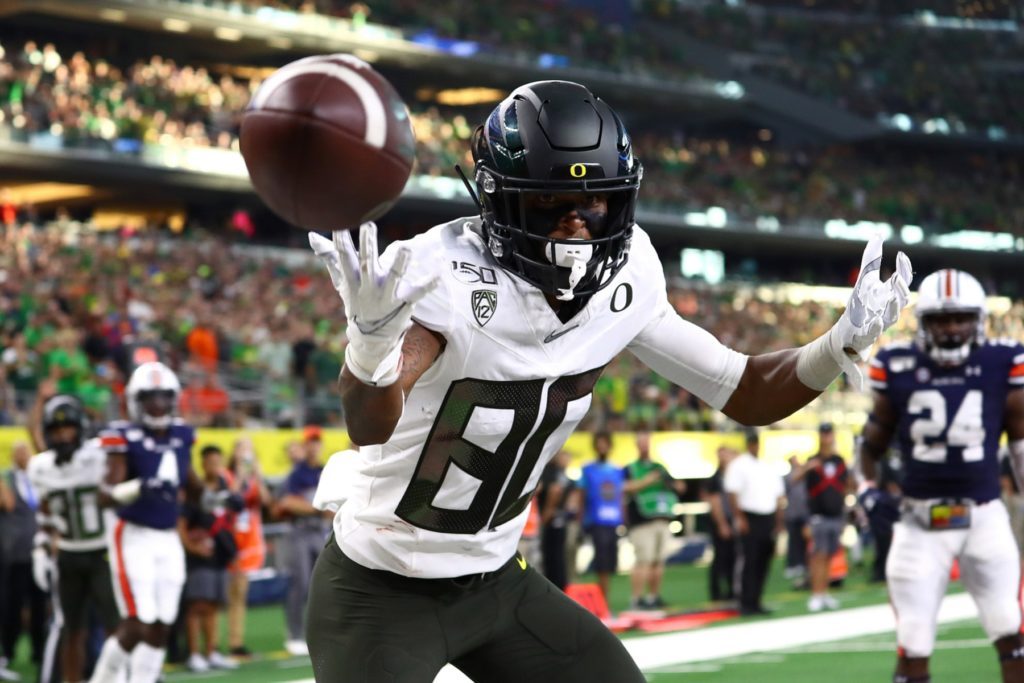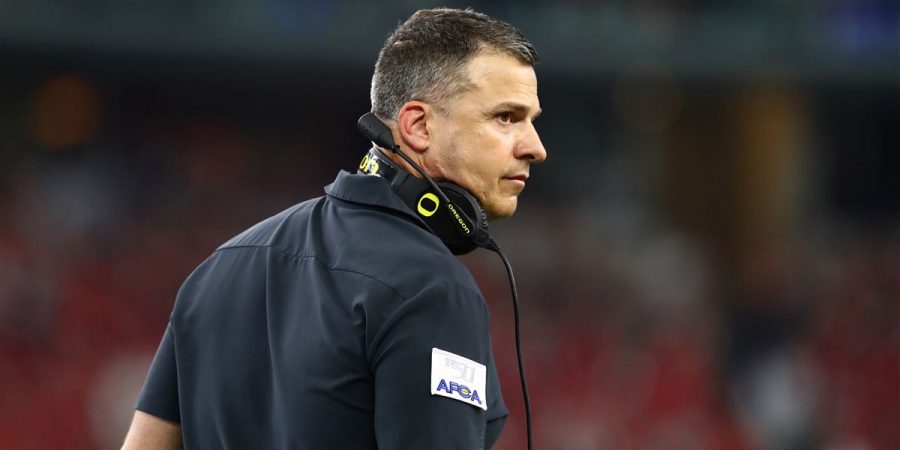Roughly 72 hours later, and the minds of Oregon fans everywhere continue to linger on last Saturday and what might have been had the Ducks held on to a 21-6 lead with just over four minutes remaining in the third quarter.
Instead, the Auburn Tigers came roaring back, scoring 21 unanswered points to cap off a stunning comeback bid that continues to leave Duck fans in a state of subsiding disbelief and simmering agitation.
Make no mistake, Saturday’s game vs. Auburn was a prove it opportunity for the Ducks following an offseason in which the Oregon coaching staff preached and emphasized the importance of taking the next step and building upon the foundation that was laid in 2018. That opportunity was squandered, and while the there were plenty of positives to take away, the final outcome is the ultimate sticking point.
As we transition from Week 1 to Week 2, WFOD examines what went wrong for Oregon against Auburn, the major gripes, and how the Ducks get better with plenty of season left to play.

1. Game management
One of the biggest points of contention in the aftermath of Saturday’s loss to Auburn was Mario Cristobal’s mismanagement of Oregon’s timeouts and the game clock at large when the Ducks had the ball late in the game. Pete Thamel of Yahoo Sports was the most notable national college football pundit driving the conversation, as his scathing column following the game essentially framed Cristobal’s mismanagement in the fourth quarter as the reason why the Ducks fell to Auburn. Thamel also cited last year’s Stanford game and Cristobal’s decision to run the ball with CJ Verdell instead of punting as another example of the second year head coach’s ineptitude as a game manager, which he believes is holding the program back. The outcome of that play, among a laundry list of other things, ultimately helped Stanford walk away with an improbable victory, as Verdell notoriously fumbled the ball allowing the Cardinal to gain possession and mount a drive that would send the game into overtime.
There’s no question that the back-to-back timeouts that Cristobal called with just over five minutes remaining vs. Auburn was a bad look, as was the timeout the Ducks burned just before their first possession of the game. Fair or not, it smacks of a coaching staff that is ill-informed and ill-prepared, despite Cristobal’s frequent declarations that he and his staff run a detail-oriented operation. But it’s not the reason why the Ducks lost. In fact, it’s hard to argue it was even a top three reason why the Ducks lost. From this perspective, Oregon fell short primarily because of two huge missed scoring opportunities deep in Auburn territory, a dearth of playmakers at wide receiver, and the fact the Ducks were facing a talented opponent who was able to exploit those mistakes and misfortunes.
Does Cristobal need to make strides as a game manager and perhaps even re-think his cavalier approach to taking a flaming torch to the timeouts he has? Absolutely. At a certain point, it’s bound to have serious ramifications if changes aren’t made. Citing that as the reason why Oregon fell to Auburn, however, feels misguided.

2. Play calling
Other than Cristobal, the only person who may have had a tougher night in the court of public opinion was Ducks offensive coordinator Marcus Arroyo, who caught plenty of heat for Oregon’s offensive ineptitude in the second half against Auburn.
If you’ve been following WFOD since the start of last season, you know that we haven’t held back in our criticism of Arroyo. The 39-year old’s lack of play calling foresight, ingenuity, and diversity has been a legitimate gripe as the Ducks produced some of their most inexplicably woeful offensive performances in recent memory during his first full season as Oregon’s offensive coordinator in 2018.
Against Auburn, however, Arroyo emerged largely blameless from our vantage point.
“Largely” is the operative word here, as Arroyo certainly wasn’t perfect Saturday. The called 4th and 1 handoff to Verdell off the left side of Oregon offensive line was a shining example of the kind of hard-headed play calling that drove Duck fans bananas last year due to its utter predictability and the fact that the Ducks running game had been completely neutralized in the second half. Beyond that, though, Arroyo did a nice job of maintaining balance between run plays and pass plays, while also finding ways to maximize what little available talent the Ducks had at wide receiver, particularly in the first half where Oregon outgained Auburn 199-161 and held a 14-6 lead heading into the break.
The second half was another story, as the Auburn defense stiffened against the run and did a tremendous job of blanketing Oregon’s depleted receiving corp, holding the the Ducks to just seven points. It was here where the criticism of Arroyo reached a fever pitch, as fans on social media were critical of the conservative approach and anemic production. Yet, in this instance, the criticism felt mostly unfounded for two primary reasons:
- Oregon’s lackluster depth at receiver finally caught up with them. Yes, the Ducks found tremendous success in the short and intermediate passing game (something that didn’t occur often last season), but at a certain point you have to prove you can threaten the defense down the field. Without guys like Juwan Johnson, Brenden Schooler, and Mycah Pittman available, the Ducks had to rely on make-shift wide receivers like Jacob Breeland and Spencer Webb – two tight ends – to get separation against perhaps the fastest and most athletic defense the Ducks will face all year. That’s a losing battle.
- Auburn’s defense is good. It can be easy to forget that there’s an opponent across the field that is as good or better than the talent you possess. Yes, Arroyo expectedly leaned on the short and intermediate passing game, but he did draw up plays in the second half that looked to challenge the Auburn defense beyond the sticks. In the those situations, however, Herbert often had no where to go with the ball, which either led to a sack (he was sacked twice in the second half) or a check down to a target in closer proximity. Auburn adjusted its scheme, which leveraged the speed of its linebackers and defensive backs to provide tremendous coverage, while the Tigers’ vaunted defensive line found more success applying pressure on passing downs in the second half. In the end, the Ducks simply didn’t have the personnel to effectively counter.

3. Maximize opportunities, play with poise
After spending some time on what wasn’t wrong with Oregon on Saturday, it’s time to address some areas where the Ducks clearly felt short. The first area is the most obvious – the Ducks need to be much better taking advantage of momentum when it swings their way.
The same issues that haunted Oregon last season were the same issues that plagued Oregon against Auburn, which ultimately resulted in the Ducks heading back to Eugene with smarting defeat. Though drops were mitigated to a significant degree in Saturday’s game, it was Bryan Addison’s dropped touchdown pass from Herbert in the first quarter that served as the play that arguably loomed most significantly. Had Addison not had Herbert’s pass bounce off his chest, the Ducks likely would have taken a 14-0 lead, which would have been nice to have considering the 27-21 final score.
Special teams, specifically field goal kicking, was also a problem last season that reared its ugly head for the Ducks on Saturday. Following Addison’s dropped touchdown pass on third down, Oregon would attempt a 20-yard field goal that shockingly went wide right off the foot of true freshman kicker Camden Lewis, preventing the Ducks from settling for a 10-0 first quarter advantage.
Though red zone foibles weren’t a common issue for the Ducks last season, the most infamous play of the 2018 season was the fumble deep in Stanford territory that was recovered and returned 80 yards for a Cardinal touchdown, sparking an improbable comeback. Unconscionably, almost the exact same scenario unfolded Saturday, as an electric 81-yard punt return by Jevon Holland gave the Ducks outstanding field position starting on the Auburn nine-yard line. Yet, it would be all be for naught, as on the very next play, Herbert and Verdell would botch an exchange resulting in an Auburn fumble recovery and 83-yard return to the Oregon three-yard line. The Tigers would convert a field goal four plays later to cut Oregon’s lead to 14-6, but a touchdown for the Ducks following Holland’s return would have given the Ducks a commanding 21-3 lead midway through the second quarter.
Those mistakes not only prevented opportunities to add points to the scoreboard, but also appeared to weigh heavily on this team mentally as the game got tighter. There was never an air of confidence or sense of calm despite the solid lead the Ducks had mounted. Is it possible the odd reoccurrence of all three of these notable issues and incidents from the past fostered feelings of trepidation and self-doubt? Either way, it seemed as if this team was waiting for the other shoe to drop, reinforcing the notion that this is a group that’s still in the process of developing a killer instinct and championship mentality. If a conference title – or more – is in this team’s crosshairs, learning to flawlessly execute in the money moments will be essential.

